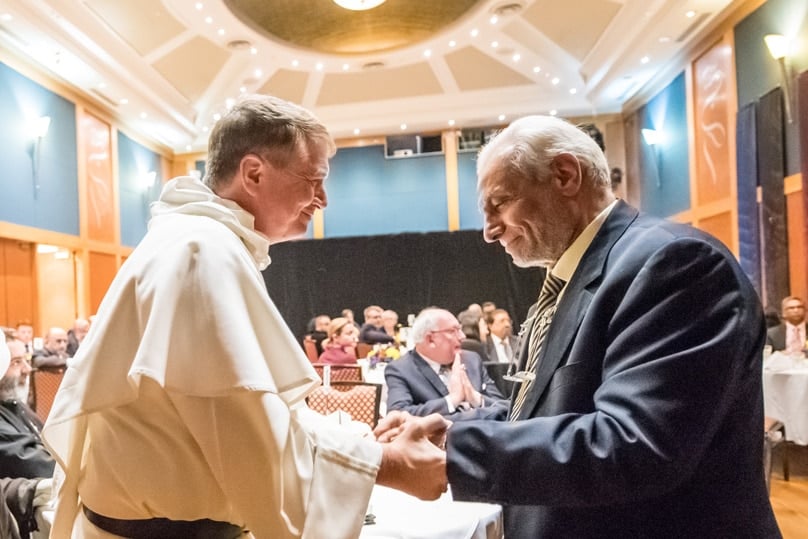
It is a great privilege to host this annual dinner. It is unusual in not being at St Mary’s Cathedral House which is presently undergoing renovations: I look forward to inviting you all back to my place next year. But in the meantime we are gathered at what is a very holy place for Catholic Christians here in Australia, because it is the former home and final resting place of our beloved Mary MacKillop. Mary was herself ahead of her time in her openness to receiving children of all faiths into her little bush schools and the emerging system of city parish schools. That leaders and representatives of all major faith traditions could gather to celebrate Iftar or Fatoor, the break-fast of this day of the Muslim holy season of Ramadan, is a tribute to the kind of country Australia is. As St. Teresa of Avila once said, keeping company with God’s friends is a good way of keeping near to God Himself; I am grateful to you all for that company tonight.
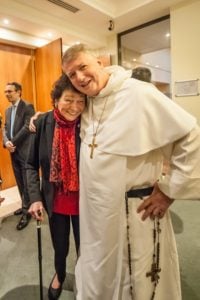
On his recent visit to Egypt, Pope Francis spoke of how our faiths offer a vision of the human person, which finds its fulfilment in relationship, both with God and with other persons, and thus encourages that conversation with God that is called prayer, and that conversation with our fellows that is called dialogue. The marks of true dialogue, His Holiness noted, are: first, respect for one’s own identity and that of others; second, the courage to accept differences; and third, sincerity of intentions. The first of these means that we do not seek to conform ourselves to others, nor do we expect others to conform themselves with us. True dialogue can only begin when we all respect ourselves and each other. Genuine conversation allows that the other person may think differently to me.
In our world today such conversation can sometimes be very difficult: it can be so much easier to focus on the differences and complain about them, as if somehow the world would be problem-free if only everyone thought the same as me about everything. But Pope Francis suggested that such an aspiration is cowardice: real courage, on the other hand, admits of difference and is strong enough to work together despite the differences, celebrating what we have in common and even celebrating the differences. And to do this, His Holiness continued, we must have sincerity of intentions: just as Socrates asked his interlocutors to tell him only what they truly believed, so too must our dialogue be sincere, more than mere lip-service or diplomatic posturing.
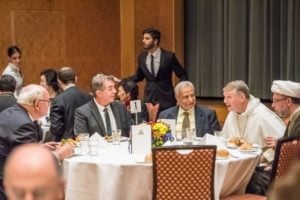
Nearly ten years ago, during World Youth Day 2008 here in Sydney, Pope Benedict XVI spoke at an interfaith gathering and suggested that the friendship between faiths demonstrated here tonight, is “all the more important at a time when some people have come to consider religion as a cause of division rather than a force for unity”, and indeed some people use it as such a divisive force. True faith, the Holy Father thought, can be a force for healing divisions, and for that friendship that comes of rectifying such discords, and for that peace that flows from true friendship. Today, more than ever, we need that genuine dialogue if we are to know friendship and peace. The endless series of horrors in the Middle East, such as the bus load of Coptic Christians slaughtered this week past apparently in reprisal for the Pope having been invited to speak in Egypt, the continuing violence and persecution of minorities, the poor and the powerless, all cry out to heaven for healing of division, building of friendships, and making of peace.
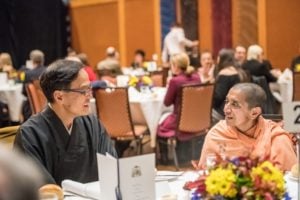
In Australia we do not face the worst challenges of places like Syria, Iraq and beyond today, though the recent atrocity in Manchester reminds us that nowhere is exempt, even those places where little girls gather to hear music. Ours is a remarkably cohesive society, in which people can be neighbours to each other whatever their religious backgrounds, schoolmates, workmates, friends. But we must not be naïve in assuming this is everyone’s experience, or all the time, or will always be so if we neglect to work at it. There are those who would seek to divide us, such as the Isis website that earlier this year threatened my dear friend the Mufti for the terrible crime of being friendly to Christians and having his photo taken with the Catholic Archbishop. I honour his courage in continuing to lead in such circumstances. The challenge of Interreligious Dialogue to which Pope Francis spoke so recently in Egypt, is a challenge as much for us as it is for those who live in distant lands. And we face two additional challenges, not so prevalent in those communities…
First, we often face a kind of relativism regarding faith and morals or indifference to traditional religion and ethics, which means we sometimes lack the kind of shared morality which is the premise for collaboration of various kinds, which is essential if children are to grow up well and adults to have direction in life, and without which our community cannot sustain crucial institutions such as marriage and the family. Only this past month we faced off an attempt to legalise abortion even of full-term babies and for any reason at all and to require all health professionals to co-operate in it; and Australia’s greatest female tennis player, who is also a Christian pastor, has been vilified for choosing not to fly with an airline that is campaigning for same-sex marriage.
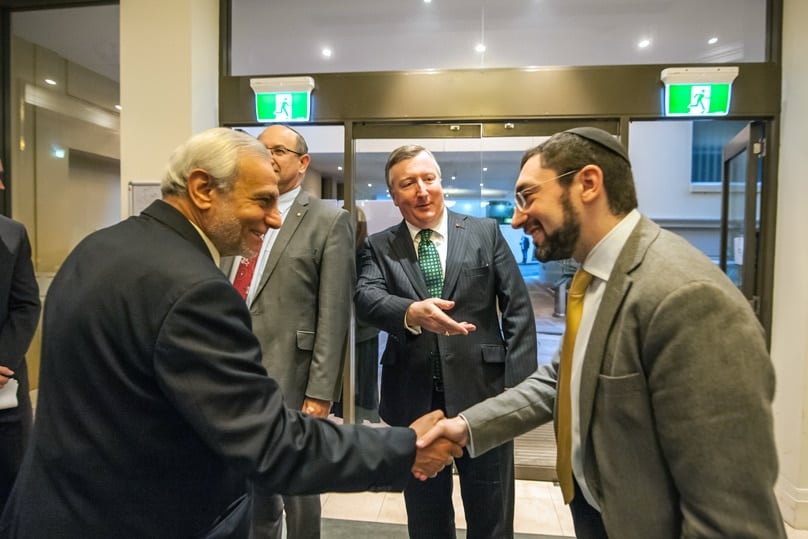
Secondly, we are challenged by a kind of anti-religious ‘religion’, a dogmatism that would exclude faith from culture, society and polity, that belittles those who believe, and insidiously infects even believers with certain secularist assumptions, such as the primacy of individual preferences over God and our God-given nature, over duty, loyalty, honour, integrity, truth. We may increasingly have to stand up for the right to educate our children according to our faith and values, to run our charities accordingly, and to live our public and private lives as people of faith without threat from those who would seek to force us to act contrary to our religious or moral conscience.
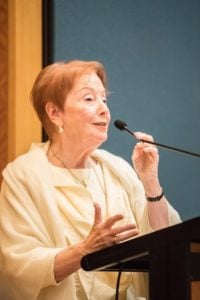
These are big challenges, but they are challenges we can and I believe we will face together as believers. We must continue to work, individually and together, to make this country a model of respectful dialogue, genuine friendship and lasting peace. If our brothers and sisters suffering elsewhere in the world for their race or religion are to be relieved, it must begin with us, repudiating all hatred and violence, showing our world a better way to live. If our brothers and sisters facing challenges even here in Australia for their faith are to be encouraged, we must show our community how reverence for God and the things of God is the surest way to a truly happy life rather than a confined one, and helps build up a good community rather than dividing it. And so tonight and always we salute each other, Al-salāmu ‘alaykum, peace be with you, and pray to God for that peace which is beyond all human understanding or achieving. And we affirm in common: God, the Holy, the Divine, the All Powerful, the All Merciful, wants peace and friendship among us.
So I thank you all tonight for your friendship, and for that genuine conversation that it both produces and allows. Together we can change the rhetoric of division to the reality of community. Your presence here tonight is testament to that.
This is an edited version of the address given by Archbishop Anthony Fisher OP at the Sydney archdiocese’s Iftar Dinner on May 29 2017 at Mary MacKillop Place, North Sydney. Guests included representatives from Muslim, Jewish, Christian, Buddhist, Hindu, Sikh and several other religious traditions.
